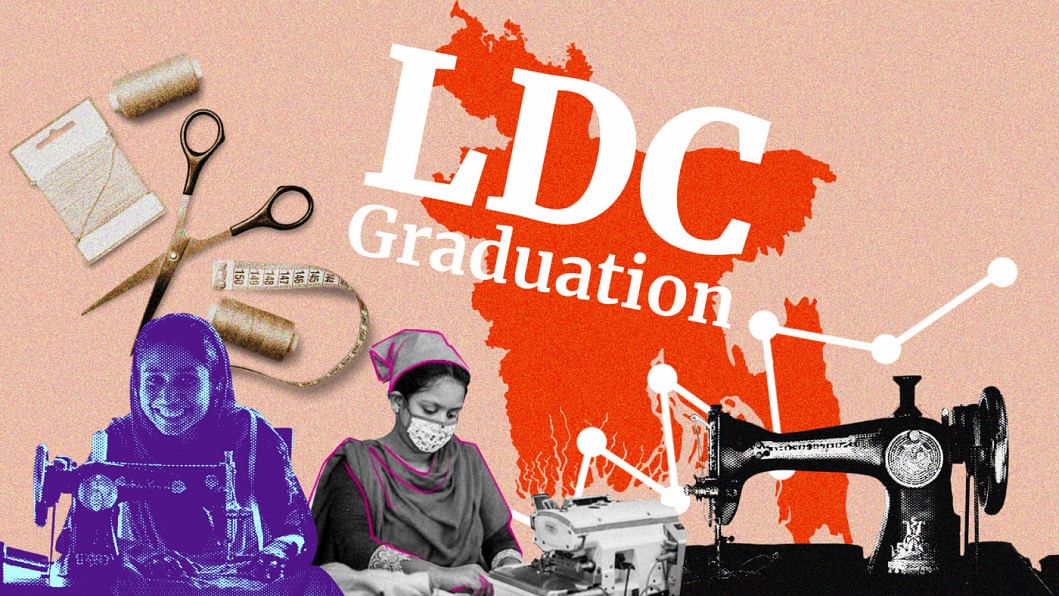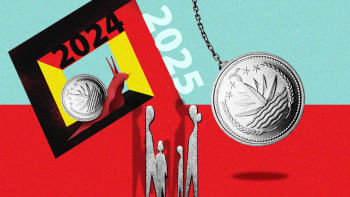Is deferment of LDC graduation a viable option for Bangladesh?

As may be recalled, Bangladesh is set to graduate from the Least Developed Country (LDC) category on November 24, 2026. However, some stakeholders in the country argue for a deferment of this graduation for an unspecified period. An objective analysis of the issue and an assessment of the veracity of these divergent views hold practical significance in shaping Bangladesh's stance in this context.
Some clarity in this regard is necessary. While specific criteria exist for including a developing country in the LDC group, it is ultimately up to the concerned country to decide whether it wants to be categorised as such. On the contrary, graduation from the group is contingent upon the LDC meeting the graduation thresholds and fulfilling the graduation procedures. In this sense, inclusion in the LDC group is "voluntary," while graduation is somewhat "mandatory."
To reinforce this point, in 2006, Zimbabwe rejected the UN Committee for Development Policy's (CDP) determination to categorise it as an LDC, stating that it "refuses to be downgraded as an LDC." On the other hand, as noted above, there is a defined procedure for an LDC's graduation. An LDC must meet the criteria for graduation and sustain the record over two successive triennial reviews conducted by the CDP. The CDP then recommends the LDC in question to the UN Economic and Social Council (ECOSOC) for graduation. Based on these recommendations, and following consultations and deliberations, the UN General Assembly (UNGA) makes the final decision regarding the graduation of the concerned LDC and the effective date of the decision. For Bangladesh, the UNGA decided that its graduation would take effect on November 24, 2026 (alongside Nepal and Lao PDR).
It is worth noting that the graduation of LDCs has been deferred in the past, even when eligibility for graduation was met. For instance, the graduation of several Pacific Island LDCs (e.g., Small Island Developing States such as Vanuatu and Kiribati) was deferred multiple times due to their vulnerability to environmental challenges. These countries were eligible for graduation primarily based on the "income-only" criteria. Similarly, Nepal, which first met the graduation criteria in 2015 (three years before Bangladesh), will graduate simultaneously with Bangladesh, as it was not recommended for graduation in 2018 due to the 2017 earthquake.
Understandably, the call for Bangladesh's graduation deferment is being led by the export-oriented RMG sector, which accounts for about 85 percent of the country's total exports. The implications of the loss of preferences for this sector and the country are significant. Since tariffs on apparel items in major markets range from 10-15 percent, the adverse impact of preference erosion on RMG competitiveness will undoubtedly be considerable. Deferment of graduation would allow Bangladesh to continue enjoying various "Special and Differential" treatment provisions in the World Trade Organization (WTO), specifically targeted at LDCs.
Indeed, among the LDCs, Bangladesh has benefited the most from preferential treatment due to its relatively higher supply-side capacities compared to most other LDCs. Not surprisingly, the country also stands to lose the most in the absence of such preferences. WTO estimates (2020) show that of the potential losses from preference erosion (in terms of foregone export earnings) for the 12 LDCs eligible for graduation at the time, 90 percent would be incurred by Bangladesh alone.
While it is conceivable that the government might, at some future point (before the November 2026 deadline), decide to request a deferment of graduation, such a request would need to be strongly justified. The CDP will closely monitor and assess the smooth transition process. Ultimately, the UNGA must be convinced of the validity of the request.
In the end, any request for deferment must also be seen as a "political call" that Bangladesh must weigh carefully. Nepal and Lao PDR are progressing towards graduation without considering deferment, while Bhutan graduated in December 2023 without seeking a deferral. Should Bangladesh choose deferment, it will be the only South Asian country, aside from war-ravaged Afghanistan, to remain an LDC beyond 2026. Is this a position Bangladesh would find acceptable?
In this context, Bangladesh's best course of action would be to prepare for smooth and sustainable graduation from the LDC group. Bangladesh has already developed a "Smooth Graduation Strategy," with concrete recommendations from seven sub-committees, awaiting approval by the National Committee on Graduation. According to the most recent triennial review by the CDP (February 2024), Bangladesh's eligibility for graduation has been reaffirmed, and as noted in the white paper committee report, "there is hardly any plausible reason, as of now, for Bangladesh to request a deferment of the exit date from the group." However, the white paper also highlights concerns about the coordinated implementation of the strategy, including challenges related to institutional and policy leadership. These concerns must be addressed with urgency and within a time-bound framework.
To this end, Bangladesh should focus on necessary reforms and structural transformations to ensure smooth and sustainable graduation. Trade policies, incentives, and import duties should be scrutinised to ensure compliance with global obligations associated with graduation. The country must transition from preference-based competitiveness to one based on skills and productivity. Adequate measures should be taken to ensure compliance with Trade-Related Aspects of Intellectual Property Rights (TRIPS) obligations, the Trade Facilitation Agreement, and other WTO-mandated agreements applicable to non-LDC developing countries. Compliance with International Labour Organization (ILO) conventions and protocols must also be ensured and enforced. Comprehensive Economic Partnership Agreements (CEPAs) should be negotiated, and "offensive" and "defensive" strategies should be designed appropriately in view of this. In the absence of membership in such trading partnerships and groupings, Bangladesh may find itself in a situation where it will need to export on a non-preferential basis, while its competitors, such as India, Pakistan, Vietnam, China and Cambodia, will enjoy preferential access to many markets (thanks to bilateral and regional free trade agreements and CEPAs to which these countries are members).
The global trading landscape is evolving rapidly, with an increased emphasis on greening trade, enhanced compliance requirements, and stricter environmental, gender and labour standards. Many of these requirements are being demanded not only by governments but also by brands, buyers, advocacy groups, and consumers.
Bangladesh's priorities must focus on domestic preparations and the implementation of its smooth graduation strategy. Reforms and structural changes must be implemented, the capacity to access regional and global markets from a position of strength must be enhanced, compliance with the newly emerging global trading regime must be ensured, and triangulation of transport, investment and trade connectivity must be established.
The discussion on deferring Bangladesh's LDC graduation should not divert attention from undertaking the urgent tasks required to address the challenges of smooth graduation and ensure its sustainability. Gaining a few additional years (if at all) must not serve as an excuse to avoid taking the necessary steps. Bangladesh's policy measures and implementation efforts must be aligned with the new and upcoming phase of its journey as a non-LDC developing country.
Dr Mustafizur Rahman is distinguished fellow at the Centre for Policy Dialogue (CPD).
Views expressed in this article are the author's own.
Follow The Daily Star Opinion on Facebook for the latest opinions, commentaries and analyses by experts and professionals. To contribute your article or letter to The Daily Star Opinion, see our guidelines for submission.


 For all latest news, follow The Daily Star's Google News channel.
For all latest news, follow The Daily Star's Google News channel. 








Comments